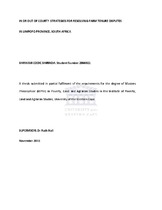| dc.contributor.advisor | Hall, Ruth | |
| dc.contributor.author | Shirinda, Shirhami Eddie | |
| dc.date.accessioned | 2016-08-01T10:57:45Z | |
| dc.date.available | 2016-08-01T10:57:45Z | |
| dc.date.issued | 2011 | |
| dc.identifier.uri | http://hdl.handle.net/11394/5162 | |
| dc.description | Magister Philosophiae (Land and Agrarian Studies) - MPhil(LAS) | en_US |
| dc.description.abstract | In this thesis I explore dispute resolution mechanisms within the context of the Extension of Security of Tenure Act, 62 of 1997 (ESTA) and more generally the extent to which the law and the court can be used to effect social change. I examine dispute resolution processes that parties to farm tenure utilise towards exercising their land rights. I give practical demonstrations of how parties on farms utilised processes to resolve eviction and burial disputes on farms in Limpopo province, South Africa. I focus on four case studies from farm dweller cases from Vhembe district, two evictions and two burials. The thesis compares and contrasts the cases settled through out of court settlements with those decided through the court processes. It is based on case files kept at the Nkuzi Development Association (Nkuzi) Elim office and follow up interviews with farm occupiers as well as court judgments on cases that were decided in court. I argue that decisions on choosing appropriate dispute resolution processes are determined by the parties’ economic position and the availability of land reform support Non-Governmental Organizations (NGOs) and lawyers. The findings drawn from the case studies show that ESTA dispute resolution mechanisms do not give choices to the parties in deciding how best to resolve tenure disputes they face, rather, they are forced to approach the courts. Parties to farm tenure disputes face challenges in using mediation and arbitration processes due to a lack of support from the relevant government agencies. These challenges ultimately deprive parties in disputes from making effective choices when deciding on a dispute resolution process that is appropriate for the dispute they are confronted with. This study concludes that ESTA is limited when offering necessary choices to the farm parties in disputes. The findings of this study point to the need for amendment of ESTA to provide parties in farm disputes with a choice of using mediation or arbitration processes directly as an alternative for those who do not want to resolve the dispute in court. In addition, an amendment should include the negotiation process and make the use of negotiation, mediation and arbitration compulsory for parties to first exhaust their use before approaching the court. | en_US |
| dc.language.iso | en | en_US |
| dc.publisher | University of the Western Cape | en_US |
| dc.subject | Vhembe district | en_US |
| dc.subject | Farm tenure | en_US |
| dc.subject | Extension of Security of Tenure Act, 62 of 1997 | en_US |
| dc.subject | Dispute resolution (Law) | en_US |
| dc.subject | South Africa | en_US |
| dc.subject | Eviction | en_US |
| dc.title | In or out of court? Strategies for resolving farm tenure disputes in Limpopo province, South Africa | en_US |
| dc.rights.holder | University of the Western Cape | en_US |

